InfoEpi Lab recently delved into the content shared on X (formerly Twitter), specifically focusing on three topics with their own keywords and datasets: Israel-Hamas, Ukraine, and vaccines. Data were collected during a two-week period in October 2023.
The results paint a picture: authors who posted about all three issues — Israel-Hamas, Ukraine, and vaccines — had an average sentiment score that was distinct from the General data. Specifically, their posts were significantly more negative.
The dataset can be found on the Harvard Dataverse. For the full report visit: Negative and Misleading Posts Driving Critical Discussions on X.
Community Leaders and Key Experts Overshadowed by Armchair Experts
Although the account owner in this example has worked in national grassroots campaigns, this person has no apparent personal connection, education, or work history related to topics the account now dominates.
Despite this, this individual outperformed the heads of state in the Israel-Hamas and Ukraine datasets, posting 292 high-performance tweets. In total, they garnered 22.7 million engagements and 807.8 million total impressions.
President Volodymyr Zelenskyy of Ukraine received 1.1 million engagements over the two weeks, while this account received over 3x the number of engagements related to Ukraine.
Exceptional tweets from this user were not limited to the topic of Ukraine. They posted more tweets receiving 20,000 or more likes than the Israeli state, the Israel Defense Forces, and the President of the United States combined.
The account owner has a history of promoting and appearing on Russian state media, spreading misleading claims about events, and casting doubt on specific incidents. In April 2022, the account owner raised questions about the Bucha Massacre:
“How did forces kill 410 civilians in Bucha, Ukraine after they had completely left Bucha, Ukraine days earlier?” – April 4, 2022
“When it comes to the Bucha massacre, facts are not the friends of the Ukrainian narrative.” – April 6, 2022
The situation captured in the Israel-Hamas data is particularly concerning. Even as the country was dealing with a lethal attack, posts from this account overshadowed community leaders, people affected by the situation, credible sources of information, and relevant experts. In the wake of that attack, even the most respected and seasons media organizations are struggling to make sense of content.
For examples of false claims and framing to support ideology, see the full report.
Narratives and Themes
The themes across the three datasets (Israel-Hamas, Ukraine, and Vaccine) also share similarities, particularly in distrust, conspiracy theories, polarization, and calls for action. However, they also have distinctive elements rooted in the specific contexts of each topic.
Similarities:
Distrust and Conspiracy Theories: High-performance tweets across the three datasets carried a strong current of distrust towards authorities or established systems. Whether it was skepticism towards the US administration and global institutions (Israel-Hamas), doubt over financial aid (Ukraine), or mistrust in COVID-19 vaccines and health authorities (Vaccine), distrust was there. Conspiracy theories were common in all three categories. The stories suggested hidden agendas or concealed truths in global politics, financial aid, or public health initiatives.
Polarization and ‘Us vs. Them’ Mentality: The “us vs. them” narrative is a common thread, creating divisions between different groups. This is seen in the Israel-Hamas context’s polarization between different geopolitical factions. With Ukraine, the discussion was more about internal and international political divisions. In the Vaccine dataset, this manifested in a division between those who trust the vaccines and health authorities from those who don’t.
Calls for Action Against Injustice: Across all topics, there’s a strong call to action and a sense of urgency to address perceived injustices. This might involve challenging leadership decisions, questioning financial aid, or demanding transparency and safety in public health interventions.
Global Impact: Each theme acknowledges the broader, global implications of the issues at hand, whether it’s international conflict, financial decisions affecting multiple countries, or a worldwide public health crisis.
Differences:
Specific Focus of Distrust and Conspiracy Theories: While distrust and conspiracy theories are common, their focus varies. In the Israel-Hamas dataset, conspiracy theories revolve around geopolitical conflict and international relations. Related to Ukraine, they’re more about financial aid and corruption. For the Vaccine dataset, stories concentrate on public health, vaccine safety, and the potential ulterior motives of global health authorities.
Cultural and Ethical Considerations: The Israel-Hamas dataset uniquely highlights the role of religious and ethical considerations in shaping narratives. This aspect is less prominent in the Ukraine and Vaccine datasets, which are more politically and scientifically oriented.
Nature of Polarization: The nature of the “us vs. them” mentality also differs. In the Israel-Hamas context, it’s largely geopolitical. In the Ukraine theme, it’s tied to national interests versus international aid; sometimes, it is tied to morality or friendship. Vaccine discussion is more about differing beliefs in science and authority.
Type of Action Advocated: The kind of action advocated varies, from military intervention (Israel-Hamas) to financial accountability and anti-corruption measures (Ukraine) to vaccine safety and informed consent (Vaccine).
These results raise concerns about the potential real-world consequences of an influential platform’s decline into information disorder. False information about public health can discourage people from taking life-saving action and deter people from getting vaccinated, directly impacting lives. False information related to armed conflict can have life-or-death consequences, and in some cases, the information itself can be a domain of warfare. This underscores the urgent need for social media platforms to address the dynamics and content encouraged by their algorithms and business models.
More Detail Available
Definitions, analysis, and data visualizations can be found in the full report, which contains the following sections:
Updates
Updated October 25, 2023 to clarify wording and to correct a formatting error.
Citation
@article{infoepi_lab2023,
author = {InfoEpi Lab},
publisher = {Information Epidemiology Lab},
title = {BRIEF: {Negative} and {Misleading} {Posts} {Driving}
{Critical} {Discussions} on {X}},
journal = {InfoEpi Lab},
date = {2023-10-24},
url = {https://infoepi.org/posts/2023/10/24-study-brief.html},
langid = {en}
}
